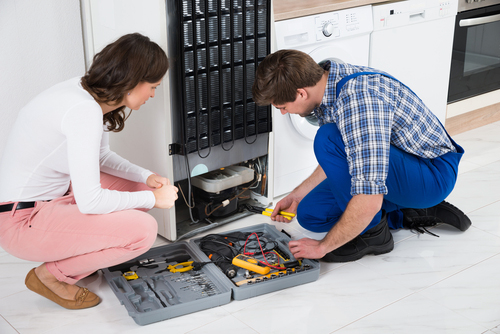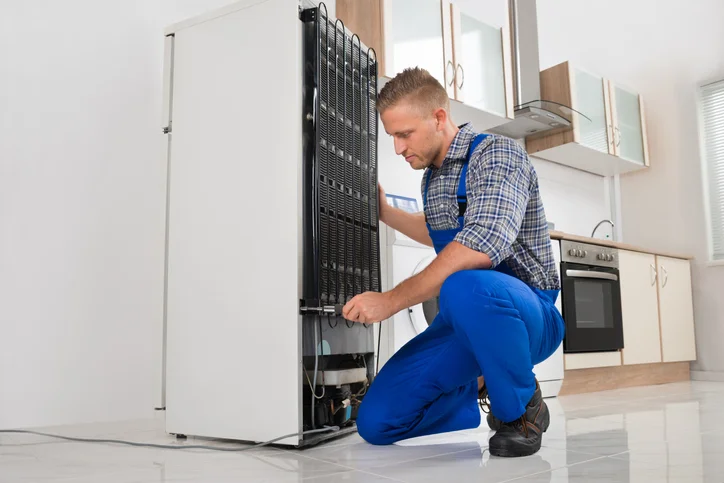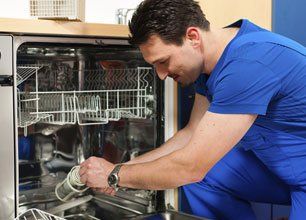Important Tips for Effective Ref Repair Work to Expand Device Life Expectancy
When it pertains to your refrigerator, correct repair service and upkeep are crucial for longevity. You may not realize exactly how little problems can rise if they're left unaddressed. Regular check-ups and simple repairs can save you from expensive replacements down the line. Comprehending usual issues and understanding when to act can make all the difference. Allow's check out some essential ideas that will certainly help you keep your fridge running smoothly for several years to come.
Recognizing Typical Fridge Troubles
Refrigerators are necessary in keeping your food fresh, however they can run into a range of usual issues that disrupt their performance. If you observe food ruining quicker than normal, check the thermostat setups or consider if the door seals are damaged. Recognizing these concerns early can conserve you time and cash in repair work, ensuring your fridge runs efficiently and efficiently.
Routine Maintenance Practices
To keep your devices running smoothly, you need to remain on top of routine maintenance practices. Clean the condenser coils, inspect the door seals, and check the temperature settings to assure peak performance. These basic jobs can save you money and time on repair work down the line.
Clean Condenser Coils Consistently
Cleansing your condenser coils frequently can greatly enhance your home appliance's effectiveness. Dust and dust develop up on these coils over time, creating your home appliance to work more difficult and take in more power. To keep them tidy, unplug your appliance and carefully eliminate any kind of safety covers.
Examine Door Seals
3 basic actions can aid you assure your device's door seals are in excellent problem. Second, clean the seals making use of cozy, soapy water to remove any particles or crud. By complying with these steps, you'll preserve your device's efficiency and longevity, saving you money on power expenses and repair work in the long run.
Display Temperature Setups
Regularly checking your appliance's temperature settings is essential for finest efficiency and efficiency. Whether you're managing a fridge, freezer, or stove, watching on these setups can stop lots of concerns. For fridges, purpose for temperatures in between 35 ° F and 38 ° F; for freezers, stick around 0 ° F. If the temperatures are expensive or low, your home appliance might function harder, wasting power and reducing its life expectancy. Utilize a thermometer to examine these settings regularly, especially after significant changes, like relocating your appliance or readjusting the thermostat. If you observe fluctuations, adjust the setups appropriately and speak with the customer handbook for guidance. By remaining aggressive concerning temperature level monitoring, you'll ensure your appliances run efficiently and last much longer.
Repairing Air Conditioning Concerns
When your fridge isn't cooling down correctly, it can result in ruined food and squandered cash, so dealing with the problem quickly is vital. Begin by inspecting the temperature level setups to verify they're at the suggested levels, generally around 37 ° F for the fridge and 0 ° F for the freezer. If the settings are correct, evaluate the door seals for any kind of spaces or damages; a malfunctioning seal can allow cozy air to enter.
Examine the condenser coils, typically located at the back or base of the unit. Clean them with a vacuum cleaner or brush to maximize performance. If troubles continue, it could be time to call a professional.
Fixing Water Leak and Ice Build-Up
If you're taking care of water leakage or ice accumulation in your home appliance, it's necessary to determine the resource of the trouble. By identifying where the water is originating from, you can stop additional issues and stay clear of costly repairs. Let's explore some reliable methods to tackle these common issues.
Determine Leak Sources
How can you effectively recognize the resources of water leak and ice build-up in your appliances? Beginning by checking the seals and gaskets on your fridge and freezer doors. A worn or broken seal can allow cozy air to get in, creating condensation and ice. Next, examine the drainpipe pan and drainage system for blockages or blockages; a backed-up drain can result in water merging. Seek any loosened connections in the supply of water line, which can create leaks. Additionally, check out the defrost drain for ice accumulation, which could disrupt appropriate drainage. By methodically examining these locations, you'll determine the source of the issue, permitting you to take the necessary steps to repair it and expand your device's lifespan.
Protect Against Ice Formation
To stop ice formation in your home appliances, beginning by validating the temperature settings are suitable. If your fridge or freezer is too cool, it can lead to too much ice build-up. Check the door seals on a regular basis; harmed seals can allow warm find out here air in, creating condensation and ice formation.
Keep the appliance well-ventilated and avoid congestion, as this can obstruct air flow - Dependable Refrigeration & Appliance Repair Refrigerator repair specialist of Oro Valley. Also, routinely defrost your freezer if it does not have an automatic defrost function.
If you observe water leakage, identify and fix any kind of obstructed drainage holes, as they can contribute to ice buildup. Lastly, clean the coils and verify they're functioning properly to keep peak efficiency. Taking these actions will help extend your home appliance's lifespan and performance.
Attending To Noisy Fridge Sounds
While it might appear alarming, a loud fridge often signifies small problems rather than significant malfunctions. Typical wrongdoers include the compressor, followers, and water lines.
Next, examine for loose things inside. Often, containers or racks can rattle, producing undesirable noise. Tighten or reorganize them to remove the noises.
If you notice a clicking sound, it could be the defrost timer. This is commonly safe but can suggest it requires examination.
An out of balance home appliance can generate vibrations and sound. Appliance Repair Oro Valley Dependable Appliance Services. Attending to these problems without delay can assist preserve your fridge's performance and prolong its lifespan.
When to Replace Parts vs. Full Replacement

Nonetheless, if your appliance is older and experiencing several issues, a complete substitute might be more cost-effective. Consider the price of repair work versus the appliance's value. If repair work surpass 50% of a new device's cost, it's typically better to purchase a replacement. Additionally, if you see ongoing issues that keep persisting, it's a sign that your home appliance has actually gotten to the end of its life. Consider these variables carefully to make the ideal choice for your needs and budget plan.
Knowing When to Call a Specialist
How can you inform when it's time to call in a specialist for device repair work? If your home appliance stops working altogether or regularly journeys circuit breakers, it's one more red flag.
You must likewise consider your own comfort level with repairs. If you're unsure regarding identifying the problem or lack the right tools, it's ideal to get to out for assistance. Remember, trying difficult repairs can lead to more damages or also safety and security threats.

Regularly Asked Concerns
Just how Commonly Should I Tidy the Fridge Coils?
You must clean your fridge coils every six months. This helps preserve effectiveness and prevents getting too hot. If you notice excessive dirt or pet dog hair, clean them much more regularly to guarantee your refrigerator runs efficiently.

Can I Make Use Of Vinegar for Cleansing My Fridge?
Yes, you can use vinegar to cleanse your refrigerator! It's an excellent all-natural cleanser that gets rid of odors and discolorations. GE appliance repair Oro Valley Dependable Refrigeration & Appliance Repair Service. Simply blend it with water, apply it to surfaces, and wipe down for a fresh, tidy refrigerator
What Temperature Should My Refrigerator Be Set To?
You ought to set your refrigerator to 37 ° F(3 ° C) for suitable food preservation. This temperature keeps your food fresh while preventing spoilage, guaranteeing your grocery stores last longer and reducing waste. It's a very easy modification you can make!
Does a Fridge Required to Be Leveled?
Yes, your fridge requires to be leveled. If it's uneven, it can impact cooling efficiency and trigger excess noise. Examine the leveling legs and change them to assure proper balance for ideal efficiency.
How Can I Minimize Fridge Energy Usage?
To minimize your refrigerator's energy usage, keep it clean and well-ventilated, inspect door seals for leaks, set the temperature in between 35-38 ° F, and avoid overloading it. These actions can considerably lower your energy bills.